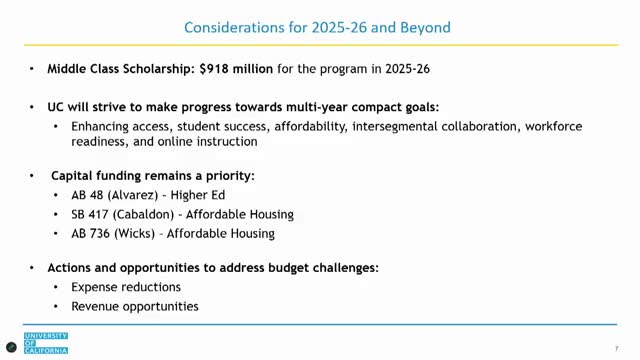University Budget Work Group Proposes Recommendations Amid Growing Fiscal Challenges
July 13, 2025 | University of California, Boards and Commissions, Executive, California
Thanks to Scribe from Workplace AI and Family Portal , all articles about California are free for you to enjoy throughout 2025!

This article was created by AI using a video recording of the meeting. It summarizes the key points discussed, but for full details and context, please refer to the video of the full meeting. Link to Full Meeting
Committee members emphasized the importance of two key legislative initiatives: a higher education bill introduced by Senator Alvarez and housing bond bills from Senator Cabaldon and Assemblywoman Wicks, both of which may appear on the ballot next year. These initiatives are seen as vital to securing additional funding for the university system.
In response to the financial landscape, the committee reviewed the work of a system-wide budget management work group led by Kajin. This group has been tasked with identifying best practices in budget and finance across all campuses. Preliminary recommendations from the work group highlighted the need for flexibility in financial management, recognizing the unique operational needs of each campus. Key recommendations included the strategic use of unrestricted returns on investments, the calibration of financial health dashboards, and the establishment of faculty startup and retention packages managed through a credit line approach.
The work group also stressed the importance of collaboration between campus leadership and budget management, particularly regarding hiring and workforce decisions. They encouraged campuses to fully utilize non-core resources, such as endowed chairs, to support academic programs. Additionally, the group recommended regular reviews of non-academic programs to ensure alignment with current priorities and the establishment of transparent budget websites to foster trust and understanding within the campus community.
As the committee prepares to finalize its recommendations, it aims to incorporate feedback from key stakeholders, with a comprehensive report expected by the end of summer. The discussions underscored the university's commitment to navigating financial challenges while maintaining its core mission of education and research. The anticipated collaboration with state legislators and the governor's office reflects a unified approach to addressing the funding gap and ensuring the sustainability of the university system in the years to come.
Converted from Finance and Capital Strategies Committee meeting on July 13, 2025
Link to Full Meeting
Comments
View full meeting
This article is based on a recent meeting—watch the full video and explore the complete transcript for deeper insights into the discussion.
View full meeting
